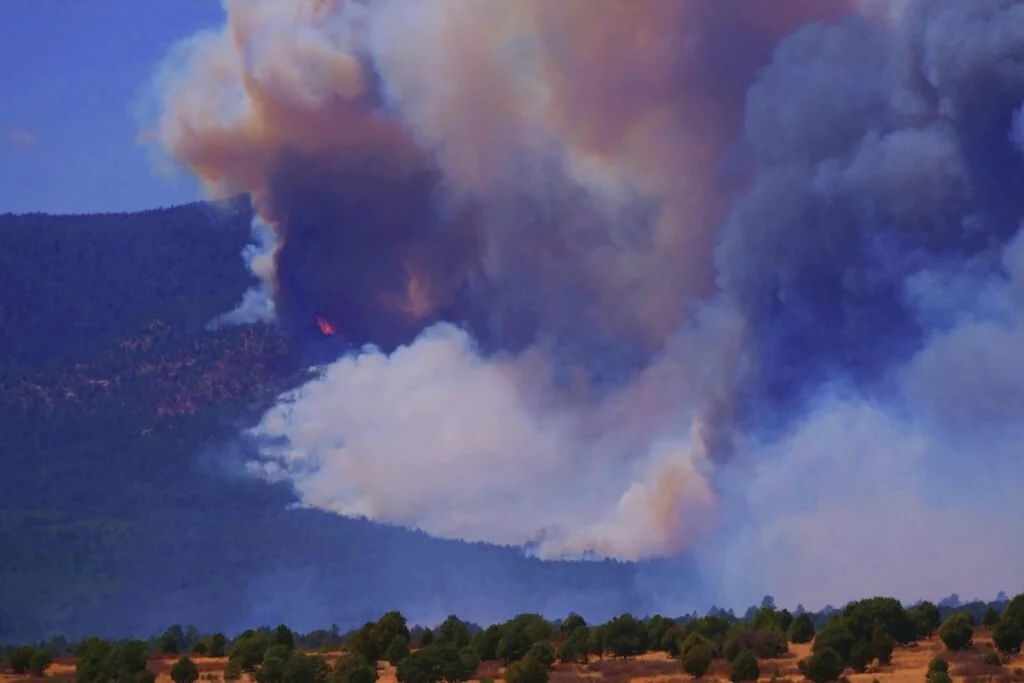Atlantis Dispatch 019:
in which ATLANTIS contemplates the complexity in an adaptive system
Image of the Calf Canyon fire (before it merged with the Hermit’s Peak fire) approximately 40 miles from the Santa Fe Institute. Currently 46% contained.
May 27, 2022
…begin transmission…
If you’ve been following our dispatches for the last little while, you’ll know that we’ve been experimenting with other possible worlds. But in the last few weeks, at our home port in New Mexico, we’ve also been brought swirling back to our own world, which, it turns out, is on fire.
Now we don’t know about you, but in the face of these fires we found ourselves wondering about climate change. We’ve also noticed that, out in the ether, the latest reflections on our global climate seem to lean toward the despairing side. It seems that for all of our (more or less valiant) attempts to shrink our carbon footprints, our individual efforts have not helped us change course. Even in our quietest pandemic hibernation, our emissions decreased by only 7%. Imagine living in the austerity of early lockdown indefinitely (a lot harder than using a steel straw). What if Atlantis told you that it still wouldn’t make a difference? It’s not surprising that many of us are inclined to think that we are so embedded in an intransigent and self-destructing energy system that we are bound to burn ourselves to death.
And yet, Atlantis, you may recall, is never a doomsaying ship. Sure, the old city may have drowned in a great flood (for technological hubris no less). But, as you can see, the city rose again! Twice! Once, in the form of a Baconian science island, and, most recently, in the form of our valiant ship! In light of our regenerative legacy, we thought it only apropos that we would turn our attention to the possibility of, well, living through the conflagration. We decided to turn our prow toward a question with some promise, a question that might help us find a way through: can we adapt better to a rapidly burning world?
Now remember: Atlantis’s home port, the Santa Fe Institute, specializes in complex adaptive systems. In this context, by adaptive, we don’t mean acting like those frogs in boiling water who get more comfortable with the pool in which they are slowly boiled to death. These are not our waters. We’re also not talking about that odd Charlie Kaufman movie in which he has writer’s block and goes orchid hunting, although this one feels somewhat closer to the heart of the matter, we admit. What we mean is something like change that allows us to continue to play our part in the great evolutionary chain of things, change that doesn’t permit the fire to engulf the tree of life. So, if our individual efforts have failed, and if our large complex systems (which are adaptive in their own ways) are actually killing a lot of life, what should adaptation really look like?
Recently, at SFI, we held our annual Science Board Meeting in which participants exchanged ideas about ways we could reconfigure one of the wildest, multi-headed creatures in the universe of complex adaptive systems: our global energy economy.
(Atlantis should be clear about something. In keeping with SFI’s new research theme, Emergent Political Economies, our global energy economy is not a singular thing. This many-headed hydra is a multiplicity of entangled systems that operate on different scales, and theorizing about them must do justice to their complex natures.)
To begin to think about how any facet of our global energy economies can adapt, let us consider in general, what adaptation might look like on a few faces of beast:
In the first place, part of the challenge is diagnosing the impediments to adaptation. One of the presenters, researcher Lint Barrage, reminded us that, at present, public beliefs that motivate adaptation are not promising, especially in the U.S. While the U.S. ranks high for vulnerability to climate disasters, housing prices and construction regulations do not reflect this vulnerability. Forget adaptation or change, people aren’t moving at all.
So what might make us move, even a little? More disasters? Economic incentives? Political policy? Cultural change? Alien invasion? All of the above?
David Victor, headline speaker at the event, called for us to shift away from our obsession with carbon reduction. For Victor, the focus should be on forging government-corporate relationships to give firms space to take risks that are essential to developing green technologies.
Likewise, SFI External Professor Jessika Trancik observed the potential for technologies to improve exponentially when governments support them. Trancik has done the analysis to suggest that government-corporate collaboration can both create both rapid growth and cause a rapid decrease in carbon emissions at the same time. A win-win.
Still, SFI Professor Sam Bowles, reminded us that adaptation might not just involve economic incentive shifts or policy guidance. Look at the public response to the pandemic, he said. Sustaining citizen allegiance to policy is extremely difficult. To sustain lasting change, he argued, requires a culture that generates coalitions of spirited citizens who share green values.
For part of the day, Atlantis despaired at the maladaptive diagnosis, but then, eventually, we found ourselves inspired! We began to wonder what adaptive businesses would look like when they’re run by firms and green citizens motivated to change the system as we know it. We’re not entirely sure what the new global energy system will look like just yet, but Atlantis suspects that with the right collaborations, the Earth could look a lot more like a living biosphere and a lot less like a flaming, but well-oiled machine.
